Memories of the accession of Queen Elizabeth II
In July, the School’s Music Department staged a summer extravaganza to commemorate the Queen’s Platinum jubilee and to lend a little texture to the music we asked OMT’s for their memories of the passing of George VI and the accession of Elizabeth II.
As with most things, it would be fair to say that the School’s response was ‘understated’ to the national events, though our correspondents do suggest that seventy years may have dimmed the memory.
King George VI died on 6th February 1952 and this holds the strongest memories:
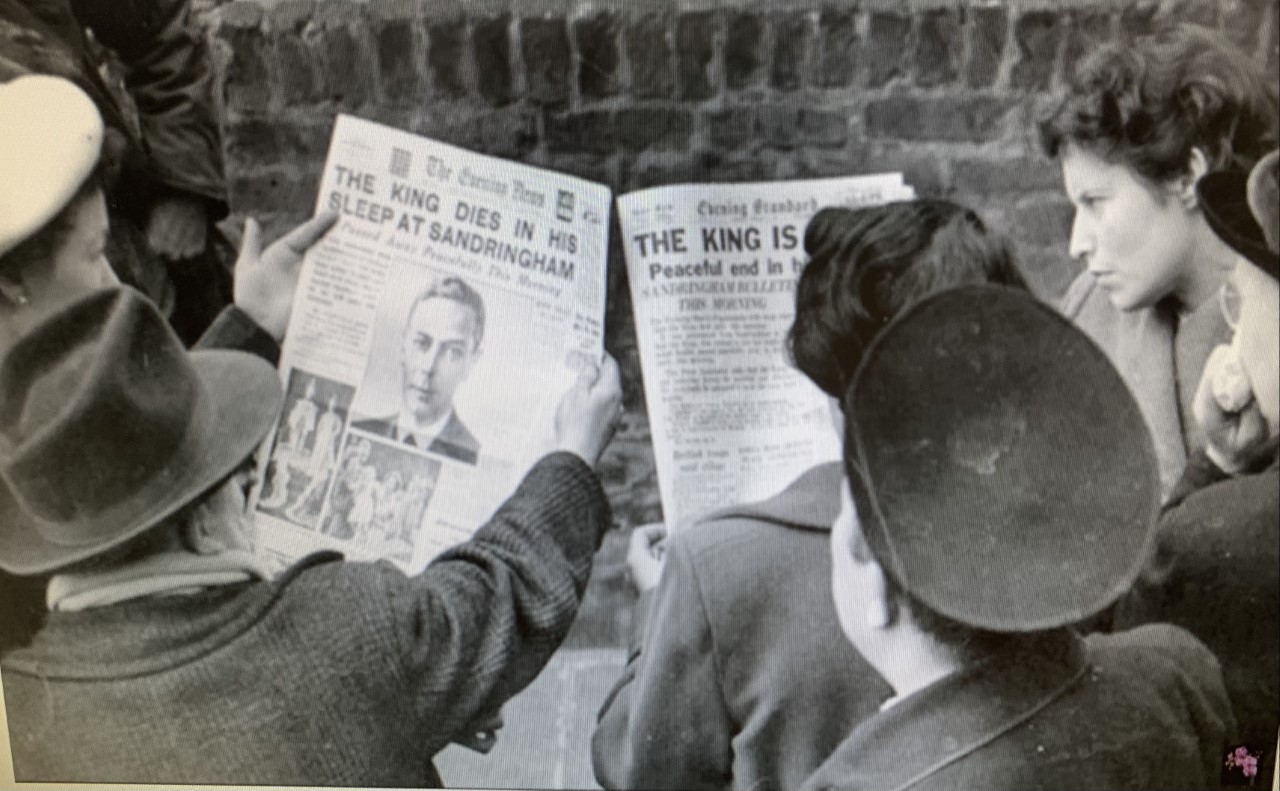
"I joined the School in January 1952 a few weeks before the King died. The Headmaster Hugh Elder announced his death at the start of morning prayers. We all knew that he was not a well man but his death was unexpected.
A day or two later we had an additional assembly to hear the proclamation of his successor the Queen on the radio." Colin List (1952–1957)
For many, the news was broken unexpectedly by teachers or friends, with the added news that the school would shut after lunch:
At around 11am on the 6th of February 1952 I was sitting in Mr Robotham's form room with my fellow fifth formers waiting for a Physics lesson.
Several minutes late as usual, "Both" came in: "Have you chaps heard" he said " The King's dead. School today will end after lunch." and with that he left, not to return. None of us had previously heard. I believe that at lunch we did receive further information. In those days lunch was taken by the whole school together. Jim Humphrey (1947-1954)
Our class was in the gymnasium, I believe at around mid-morning, when Jake Brown, the gym master got called to the phone in his office and came out and told us to please get back into our school uniform and quietly go home – the king has just died. John Short (1947-1954)
I remember hearing about the king's death standing in the corridor mid-morning outside the " Lun" (it's surprising how these little incidents stick in the brain – like where were you when Pres Kennedy was shot?) Tony May (1948–1955)
School resumed the next day and the pupils were summoned to the Great Hall to hear the proclamation of the new Queen, broadcast on the radio.
I remember being in the Great Hall, I think it was the morning after the King’s death, when the live BBC broadcast was played to us with a message along the lines of “The King is dead, long live the Queen”. “God save the Queen” was played and we all stood to attention. Martin Boothman (1949–1955)
I recall my Walter housemaster, Mr.Grundy, announcing the news of the King’s death on 6th February 1952 and the school flag going to half-mast.
Morning prayers in the Great Hall the next day was a special service at which we were ordered to wear black ties. Tony Wright (1950–1957)
The Proclamation heard in the Great Hall may have been the one read in the London Exchange, just along from Merchant Taylors’ Hall in Threadneedle Street – it can be seen in this link.
Andrew Cuthbert (1950–1954) has another memory:
I remember arriving out of a city tube station in London on my way to sign up aged 16 to seven year apprenticeship to my Master, my step father, for the Freedom of the City and MT Company. As I emerged the first thing that greeted me were bill boards saying: “The King has died”.
I also remember that a detachment of our school CCF was chosen with many other schools to line the route of King George VI cortège through London.
He is the only correspondent to mention the CCF’s participation of the funeral of King George VI, though many recall some participation in the coronation of Elizabeth.
The Taylorian of March, 1952, marked the event in its Editorial.
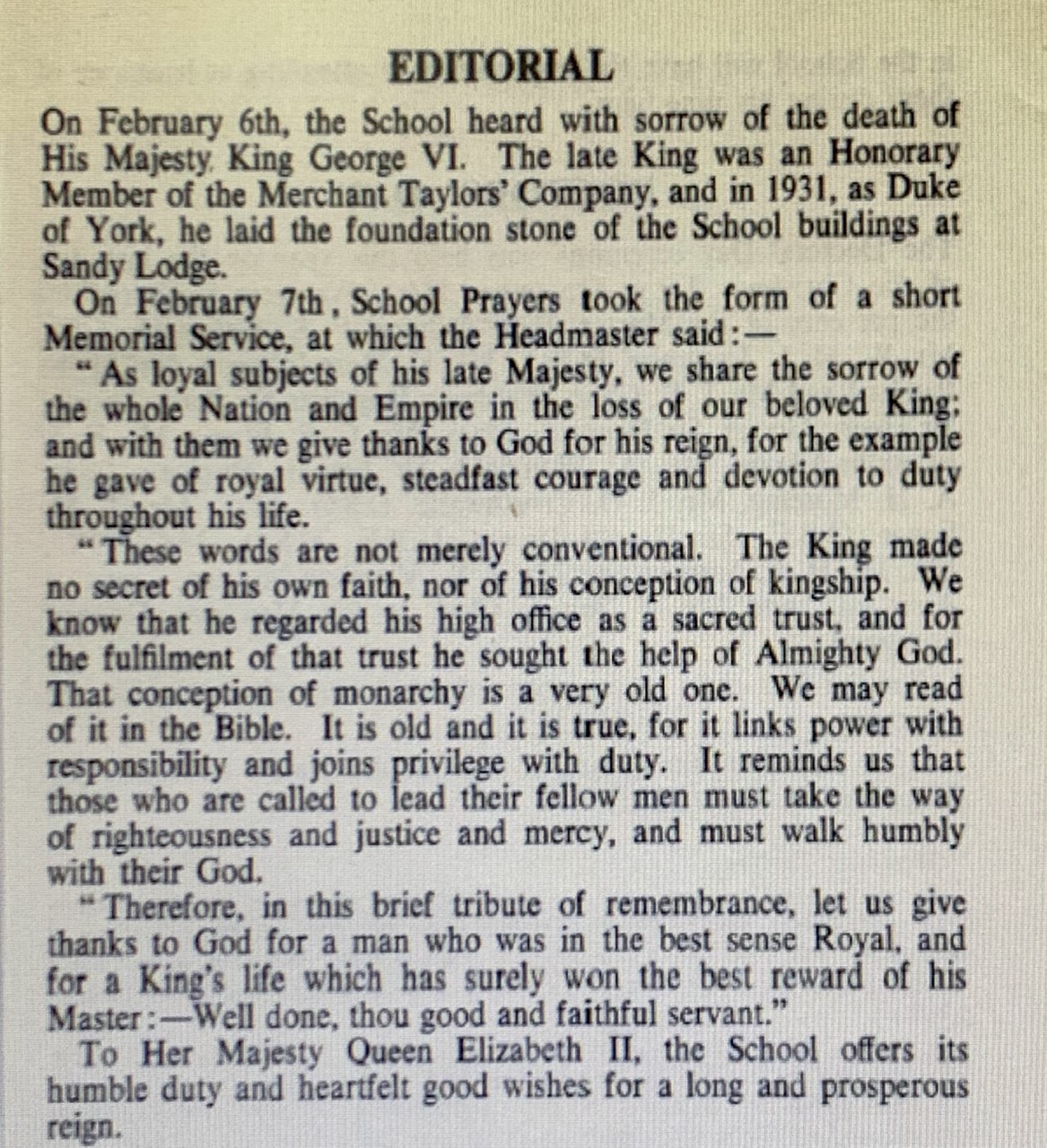
The Coronation
Given that this was a National Holiday it is unsurprising that there are fewer distinct memories of the School’s response to the Coronation. Nevertheless, for some of our correspondents, the day would not be forgotten.
We had the day off so we could watch it on TV. There were no flags or bunting around the School. It was just another national event.
The only amusing event was the headmaster singing "Lord save the king" and quickly changing it to Queen at a Sunday morning service for Manor boys shortly after the King' death. Colin List
I must have been in, or have just finished, my year in the Fifth form. I have a vivid memory of going up to London the night before the coronation and sitting on the pavement in Regent Street to see the procession – the police made us stand from 6 am, but it was well worth it. The recollection of what we did about toilet arrangements has long gone! Ernest Newhouse (1950–1957)
Graham Kimber (1949-1954) may have had the best seat in the house:
On 2nd June 1953 I was a sergeant in the School CCF and was one of 3 members of the School CCF selected to attend the Coronation! Dobbs or Dodds was another but I cannot remember the 3rd.
We three had to be on parade at Eaton Square at 4am in full CCF uniform and join many other cadets from other schools CCFs--probably about 50 in total. We were then marched to and onto the Victoria and Albert Memorial right in front of Buckingham Palace. There we remained for the entire day. During the morning the achievement of Hilary and Tenzing was announced!
The Gold State Coach took Elizabeth & Philip to Westminster Abbey at about 10.30am and the 3hr service started at 11.15. The return procession to the Palace started about 2.30pm and took 2 hours to complete its route with 16,000 participants. By then it was raining and the most memorable personality was Queen Salote of Tonga who refused to have the roof of her carriage put up because she was enjoying waving to the crowds so much.
What a memory and how fortunate I was.
Nothing, however, will beat the memories of Anthony Payne (1952 – 1959) and Andrew Thomson (1952 - 1956) who were more than disappointed by their Coronation Mugs:
The only thing I can remember about the Coronation celebrations is that we were all presented with a china Coronation mug: we collected in the Great Hall and some bigwig arrived and presented the first 10 (20? 30?) mugs and then shoved off, and the rest were handed over by Monitors. I remember Lang senior handing over a mug to his younger brother and bowing ironically as he did so. Anthony Payne (1952 – 1959)
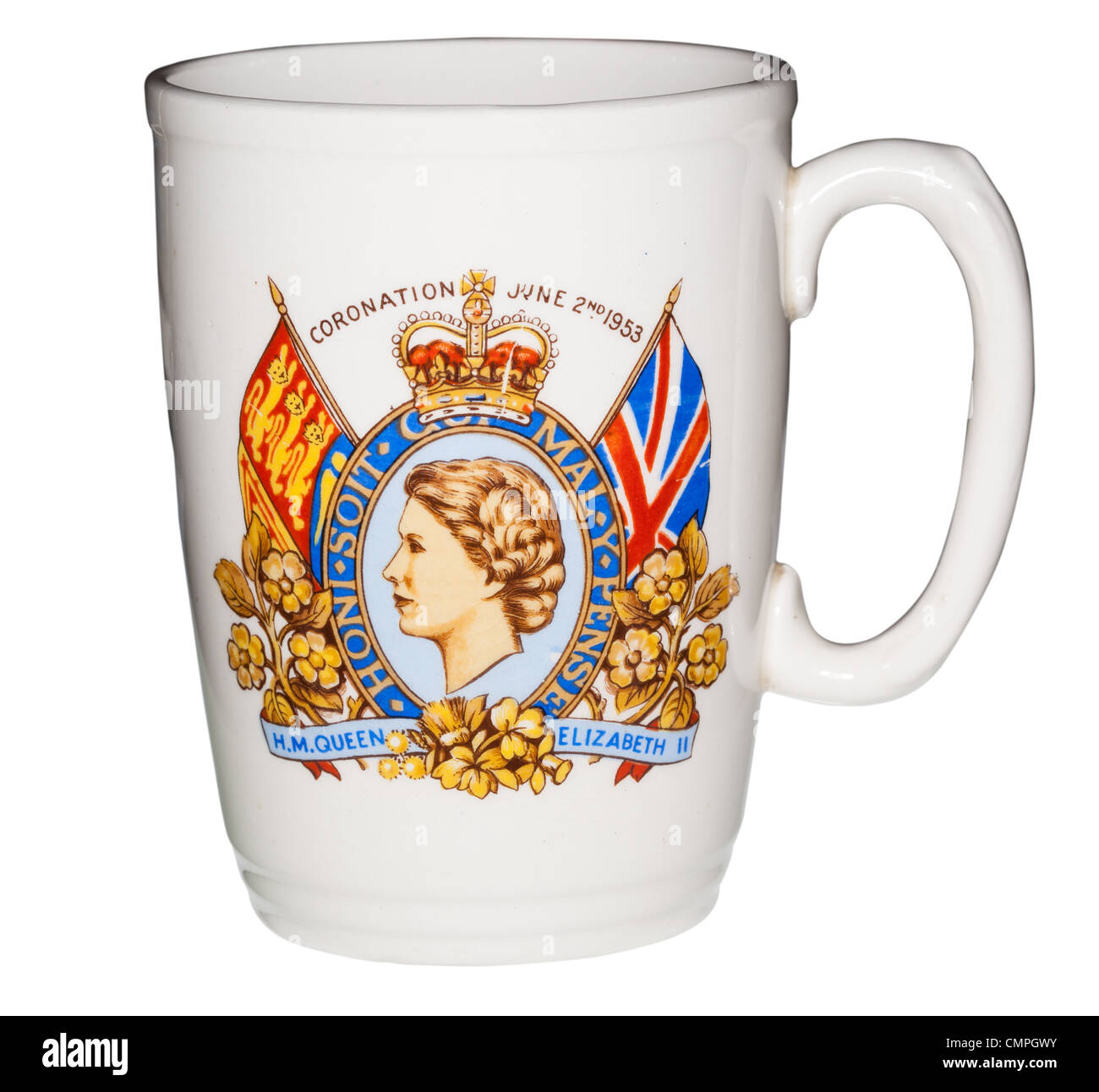
My recollections are pretty clear. The Coronation took place, I think during the first week of the summer holidays in 1952. As I did not start at MTS until that autumn joining as a boarder in The Manor of the Rose at the beginning of September, I missed any celebrations the School may have had at the end of June before breaking up. What I do remember is that during the first week of the autumn term Hugh Elder the HM announced at morning prayers that all juniors would be given coronation mugs as a memento and that they would be distributed to us in the Great Hall after school one afternoon. Full of excitement, as a new boy, I gathered with my form members or house members, I cannot remember which, and we were called up to the Head's chair at the front of the Monitor's table and we were each given our trophy. Well what a disappointment - they were of such poor quality with terrible transfers!
As soon as we were out of the Hall some of the older boys were so disgusted that a challenge was started to see how high we could make them bounce! Needless to say, few survived and I remember throwing or kicking mine up the drive to the Manor.
Ted Rider, our housemaster was not amused when he heard what we had been doing---but then that was Ted and I suppose he was right. I have often wondered how many of those mugs remain in existence. Andrew Thomson (1952 - 1956)
The Taylorian yields other clues to the more subtle acknowledgement of the School – as with MTS in 2022, the Music Department’s summer concert was focused on English composers, whilst the School magazine carried a Coronation Ode.
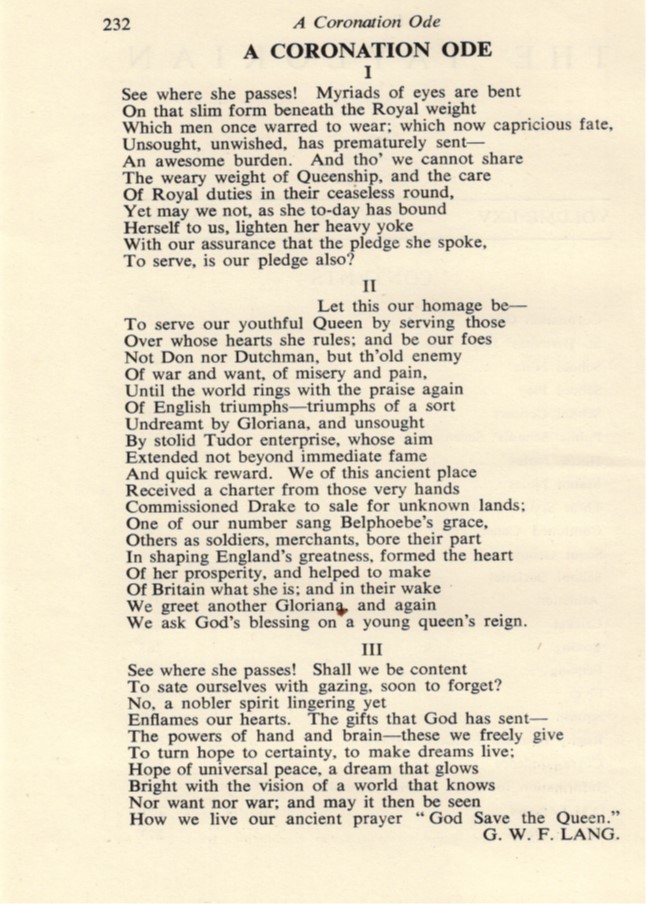
The Editorial for July, 1953 reflected on the times:
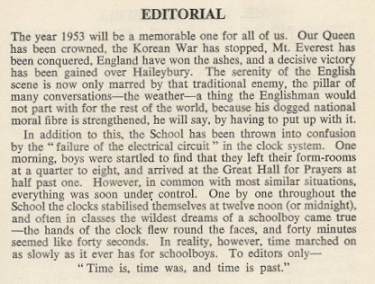
However, could anyone have known just how prophetic Hugh Elder’s speech at St Barnabas day in 1952 would be:
During the year the School, like everybody else, had been affected by three events of national importance: a general election, the death of the King, and the accession of his successor. The whole School mourned the passing of the King, and assembled to hear the broadcast proclamation of Queen Elizabeth II.
Might the youngest of those that heard it be very old before they took part in the proclamation of another sovereign.
Taylorian July 1952